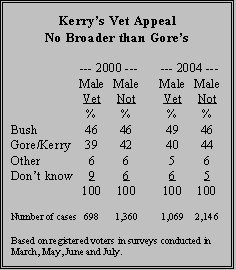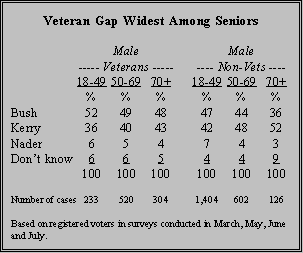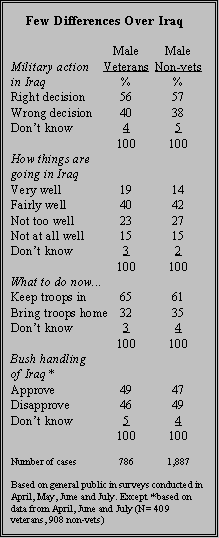 Despite Sen. John Kerry’s military background and his campaign’s concerted efforts to court veterans, he runs no better among this group than Al Gore did four years ago. Based on surveys conducted March, May, June and July, men who have served in the armed forces favor Bush over Kerry by a 49% to 40% margin. Male veterans favored Bush over Gore by about the same margin (46% to 39%) in the closing months of the 2000 election.1
Despite Sen. John Kerry’s military background and his campaign’s concerted efforts to court veterans, he runs no better among this group than Al Gore did four years ago. Based on surveys conducted March, May, June and July, men who have served in the armed forces favor Bush over Kerry by a 49% to 40% margin. Male veterans favored Bush over Gore by about the same margin (46% to 39%) in the closing months of the 2000 election.1
As was the case in 2000, there is only a small “veteran gap” in the current campaign. Bush leads among male veterans by nine points (49%-40%), while male non-veterans are almost evenly divided in their candidate preferences (46% Bush/44% Kerry). During the Democratic primary campaign, there also were no indications Kerry had made inroads among veterans. Exit polls from the New Hampshire and South Carolina primaries showed he ran about as well among veterans as non-veterans in those states.
The veteran gap is most distinct among men in the oldest age group. Veterans from the World War II-Korean War era tilt slightly to Bush (48%-43%). But non-veterans in that group a much smaller segment of the 70+ population favor Kerry by a wide margin (52%-36%).
 Men under age 50 tend to be the strongest Bush supporters overall, and this is particularly the case when they have military experience. Vets age 18-49 meaning their service occurred after the Vietnam conflict favor Bush over Kerry by a 52% to 36% margin. Non-vets in the same age range lean toward Bush by a slimmer 47% to 42% margin.
Men under age 50 tend to be the strongest Bush supporters overall, and this is particularly the case when they have military experience. Vets age 18-49 meaning their service occurred after the Vietnam conflict favor Bush over Kerry by a 52% to 36% margin. Non-vets in the same age range lean toward Bush by a slimmer 47% to 42% margin.
Vietnam-era vets (age 50-69) favor Bush by nine points (49% to 40%) while those in the same age group who did not serve lean toward Kerry by a 48% to 44% margin.
The War in Iraq
Veterans overall are no more supportive of the decision to take military action in Iraq than are non-vets. Overall, 56% of men with military experience think the U.S. did the right thing in going to war in Iraq, while 40% say it was the wrong decision.
 This is virtually identical to opinion among male non-vets (57% right decision, 38% wrong). Even when age is taken into account, there is no evidence that military veterans have a fundamentally different view of the decision to go to war.
This is virtually identical to opinion among male non-vets (57% right decision, 38% wrong). Even when age is taken into account, there is no evidence that military veterans have a fundamentally different view of the decision to go to war.
About this Analysis
This analysis is based on data from seven surveys conducted between March and July of 2004. Data was combined in order to aggregate a sufficient number of interviews to analyze small population groups with a reasonable amount of accuracy.
1. In this analysis, the term “veteran” includes those who are still active in the military. The analysis focuses on men only because so few women (roughly 3% in these surveys) report military experience.


